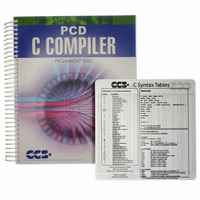PCDIDE COMPILER Custom Computer Services Inc (CCS), PCDIDE COMPILER Datasheet - Page 174

PCDIDE COMPILER
Manufacturer Part Number
PCDIDE COMPILER
Description
PCD C-COMPILER PIC24, DSPIC
Manufacturer
Custom Computer Services Inc (CCS)
Type
Compilerr
Datasheet
1.PCD_COMMAND_LINE_COMPILER.pdf
(373 pages)
Specifications of PCDIDE COMPILER
For Use With/related Products
Microchip PIC24/dsPIC®
Lead Free Status / RoHS Status
Not applicable / Not applicable
Other names
429-1008
- Current page: 174 of 373
- Download datasheet (4Mb)
assert( )
Syntax:
Parameters:
Returns:
Function:
Availability:
Requires:
Examples:
Example Files:
Also See:
atoe( )
Syntax:
Parameters:
Returns:
Function:
Availability:
Requires:
Examples:
Example Files:
Also See:
160
write_program_memory( address, dataptr, count );
string is a pointer to a null terminated string of characters.
Result is a floating point number
Converts the string passed to the function into a floating point representation. If
the result cannot be represented, the behavior is undefined. This function also
handles E format numbers .
All devices
#INCLUDE <stdlib.h>
char string [10];
float32 x;
strcpy (string, "12E3");
x = atoe(string);
// x is now 12000.00
None
atoi(), atol(), atoi32(), atof(),
assert (condition);
condition is any relational expression
Nothing
This function tests the condition and if FALSE will generate an error message on
STDERR (by default the first USE RS232 in the program). The error message will
include the file and line of the assert(). No code is generated for the assert() if
you #define NODEBUG. In this way you may include asserts in your code for
testing and quickly eliminate them from the final program.
All devices
assert.h and #USE RS232
assert( number_of_entries<TABLE_SIZE );
// If number_of_entries is >= TABLE_SIZE then
// the following is output at the RS232:
// Assertion failed, file myfile.c, line 56
None
#USE
RS232,
RS232 I/O Overview
printf()
Related parts for PCDIDE COMPILER
Image
Part Number
Description
Manufacturer
Datasheet
Request
R

Part Number:
Description:
PROTOTYPING BOARD FOR PIC MCU
Manufacturer:
Custom Computer Services Inc (CCS)

Part Number:
Description:
Extra CCS C Manual
Manufacturer:
Custom Computer Services Inc (CCS)

Part Number:
Description:
MACH X Programmer
Manufacturer:
Custom Computer Services Inc (CCS)

Part Number:
Description:
PCD For 24-bit (PIC24/dsPIC)
Manufacturer:
Custom Computer Services Inc (CCS)

Part Number:
Description:
LOAD-n-GO Programmer
Manufacturer:
Custom Computer Services Inc (CCS)

Part Number:
Description:
EMBEDDED INTERNET DEVELOPMENT KIT W/PCWH
Manufacturer:
Custom Computer Services Inc (CCS)

Part Number:
Description:
PIC24F Development Kit With PCWHD
Manufacturer:
Custom Computer Services Inc (CCS)

Part Number:
Description:
PIC24F Development Kit With PCDIDE
Manufacturer:
Custom Computer Services Inc (CCS)

Part Number:
Description:
PIC24H Development Kit With PCWHD
Manufacturer:
Custom Computer Services Inc (CCS)

Part Number:
Description:
USB Master Prototyping Board
Manufacturer:
Custom Computer Services Inc (CCS)










